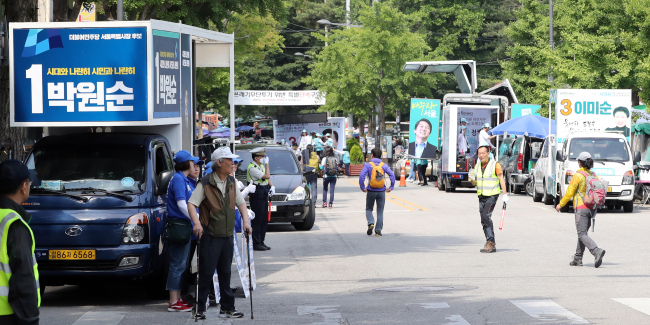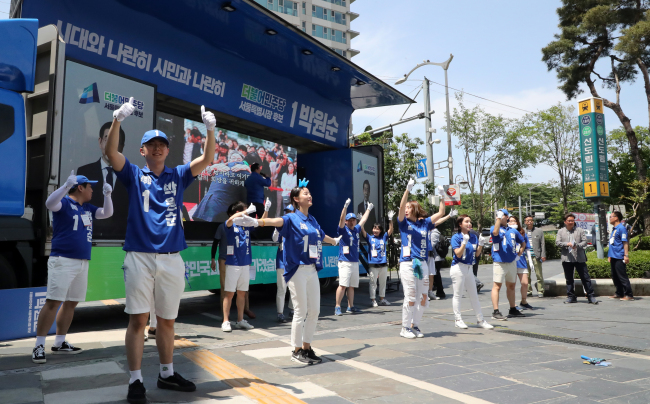[2018 Local elections] Ire grows at campaign trucks' loud noise, illegal parking
By Jo He-rimPublished : June 4, 2018 - 17:20
Complaints of loud noise and illegal parking by political canvassing trucks of candidates are mounting across the country as official campaigning for the upcoming local elections and parliamentary by-elections kicked off Thursday.
“The theme songs blaring from the trucks reach my apartment. I understand it is the election period, but it seems like there is no regulation,” Kim Jang-eun, 37, told The Korea Herald.
Remodeled trucks with loudspeakers crisscrossing neighborhoods while blaring music and chants encouraging voters to support candidates are common during campaigning, but more citizens appear to be finding them a nuisance.
“The theme songs blaring from the trucks reach my apartment. I understand it is the election period, but it seems like there is no regulation,” Kim Jang-eun, 37, told The Korea Herald.
Remodeled trucks with loudspeakers crisscrossing neighborhoods while blaring music and chants encouraging voters to support candidates are common during campaigning, but more citizens appear to be finding them a nuisance.

“I think the noise problem pops up every election season, but nothing has changed. As far as I can remember, I think they were there when I was in my 20s,” the Seoul resident said.
While there are laws that prevent protests and rallies from causing noise above a certain decibel, there is no regulation on the level of sound for election canvassing.
According to Article 79 of the election law, candidates are allowed to use portable public address equipment and loudspeakers installed on vehicles. The law only limits the hours that the amplifiers can be used: The loudspeakers on vehicles can be used from 7 a.m. to 9 p.m. and portable amplifiers from 6 a.m. to 11 p.m.
“We all know it is the local elections season. And it is not like I will change my vote because of the theme songs or candidates shouting into the microphone,” Yun Doo-wool, an office worker from Dongjak-gu, Seoul, told The Korea Herald. “I think there should be a rule to prevent playing such loud music for more than five minutes.”
There are also complaints about the colorful remodeled trucks with photographs of candidates illegally parking on roadsides, sidewalks and crosswalks.
While such parking is clearly against the traffic law, it often goes unpunished by police or local governments during election periods.
“It is illegal for these canvassing trucks to park on those spots, but police officers often think it is OK because it is the campaign period, and do not regulate them,” a police official told a local news outlet.

These complaints are not limited to specific regions, as the country will be electing 17 chiefs of provinces and cities, 226 heads of smaller administrative units, 824 seats in provincial and metropolitan assemblies, 2,927 lower-level local councilors and 17 superintendents of education. Parliamentary by-elections will also be conducted in 12 districts nationwide.
As for Busan, the nation’s second-largest city, more than 166 complaints about noise were reported to Busan Metropolitan Police Agency on Friday and Saturday, according to police. Only two complaints on noise were reported to the regional police agency in April, but the number of complaints has increased as the election date draws closer, with 97 cases reported in May.
As for North Jeolla Province, Jeonbuk Provincial Police Agency said 28 reports of loud noise were made from 7 a.m. to noon on the first day of official campaigning on Thursday.
The National Election Commission said when such complaints calls are made, they notify the relevant candidate.
“But the canvassing trucks and usage of loud speakers cannot be punished because they are legally permitted,” Cha Tae-wook, an official from the NEC, told The Korea Herald. “We are aware of the noise problem, and we also believe some kind of a measure should be instituted to resolve it.”
Cha explained the NEC had delivered a revision proposal to the National Assembly in 2011, which sought to ban theme songs playing on the trucks, and allow only speeches by candidates on parked trucks. But it has not been discussed further.
“But it is a short period of canvassing, and it is the only time when the candidates and voters can directly interact with each other, so we have to consider the pros and cons,” Cha added.
By Jo He-rim (herim@heraldcorp.com)





![[Herald Interview] 'Amid aging population, Korea to invite more young professionals from overseas'](http://res.heraldm.com/phpwas/restmb_idxmake.php?idx=644&simg=/content/image/2024/04/24/20240424050844_0.jpg&u=20240424200058)












![[KH Explains] Korean shipbuilding stocks rally: Real growth or bubble?](http://res.heraldm.com/phpwas/restmb_idxmake.php?idx=652&simg=/content/image/2024/04/25/20240425050656_0.jpg&u=)

